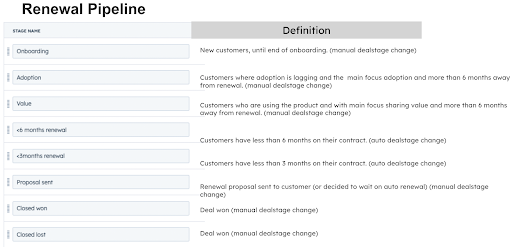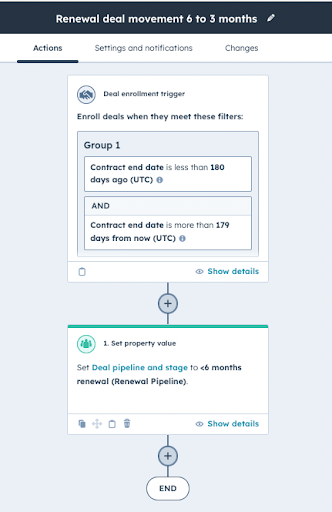HubSpot Renewals Pipeline: How to Build and Automate It
If you’re managing customer success in HubSpot, having a clear renewals pipeline is essential for increasing retention, reducing churn, and forecasting revenue. This guide walks you through how to set up a dedicated HubSpot renewals pipeline, define the right deal stages, create CS-specific properties, and automate the process end-to-end.
Why You Need a HubSpot Renewals Pipeline
Renewals shouldn’t be managed in spreadsheets or email reminders—they belong in your CRM. Creating a renewals pipeline in HubSpot helps your team:
-
💬 Collaborate across CSMs, Account Managers, and Sales
-
📊 Track revenue from both new business and customer retention in one place
-
📈 Make CS impact measurable with trackable health scores and renewal drivers
1. Create a “Renewals Pipeline” in HubSpot
Step 1: Set Up the Pipeline
-
Go to Sales → Deals → Pipelines in HubSpot.
-
Click Create Pipeline, and name it “Renewal Pipeline.”
Step 2: Define Your Deal Stages
We recommend using a hybrid of descriptive stages and time-to-renewal stages, tailored to your ICP, ACV, and contract length.
Example Pipeline Stages:
-
Onboarding
-
Adoption
-
Value (3 and 6 months to renewal)
-
Proposal Sent
-
Closed Won
-
Churn
🔁 If you have a complex onboarding process, consider creating a separate onboarding pipeline to avoid overlap.

2. Add Custom Deal Properties for Customer Success
Create CS-specific deal properties to ensure all critical renewal info is captured in HubSpot:
-
-
Deal Amount: Projected renewal value.
-
Current Deal Value: Original deal’s contract value.
-
Contract & Commercial Info: End/renewal date, auto-renewal status, number of users, upsell potential, indexation clauses, etc.
-
CS Score / Health Score: Account health rating based on product usage, support tickets, etc. Sync this with the company record.
-
Churn Risk Indicator: Even high-score accounts might be at risk due to financial challenges, M&A, or internal shifts.
-
3. Automate Your HubSpot Renewals Pipeline
✅ Automation 1: Create the First Renewal Deal
Trigger: When a new deal is marked Closed Won.
Action: Automatically create a new deal in the Renewals Pipeline, placed in the correct stage based on contract end date.
✅ Automation 2: Time-Based Deal Movement
Move deals through pipeline stages based on how close they are to renewal:
-
6 Months → > 3 Months
- 3 Months → Proposal Sent

✅ Automation 3: Post-Renewal Actions
-
Closed Won:
-
Create a new renewal deal with an updated end date (e.g., +365 days).
-
Copy over relevant fields.
-
-
Closed Lost:
-
Update lifecycle stage to “Former Customer.”
-
🎯 Use health scores to identify at-risk accounts and proactively engage them.
🎉 Celebrate renewals with automated gifting or appreciation emails.
4. Reporting & Dashboards for Renewal Tracking
Once your renewal pipeline is live, create custom dashboards in HubSpot for visibility. Recommended dashboards:
-
Forecasted Upsell/Downsell:
Deal Amount – Current Deal Value -
Upcoming Renewals: Deals by renewal date, CSM, or AM
-
Renewals by Health Score: Segment deals by account health
-
Deals at Risk: Based on churn risk property
-
ARR at Risk: Total annual revenue exposed to churn
5. Leveraging ImpactPilot with Your Renewal Pipeline
ImpactPilot helps analyze renewals and customer success metrics:
-
Analyze impact driver performance across renewals and churned accounts.
-
Segment accounts by deal stage, renewal date, or health score.
-
Build account plans for:
-
Customers needing renewal
-
Accounts with upsell opportunities
-
At-risk customers
-
Final Thoughts
Building a renewals pipeline in HubSpot isn’t just about tracking deals—it’s about creating a structured, data-driven, and collaborative process that aligns sales, success, and revenue teams. With the right pipeline, properties, and automations, you can drive higher retention, forecast revenue accurately, and make your CS impact visible.